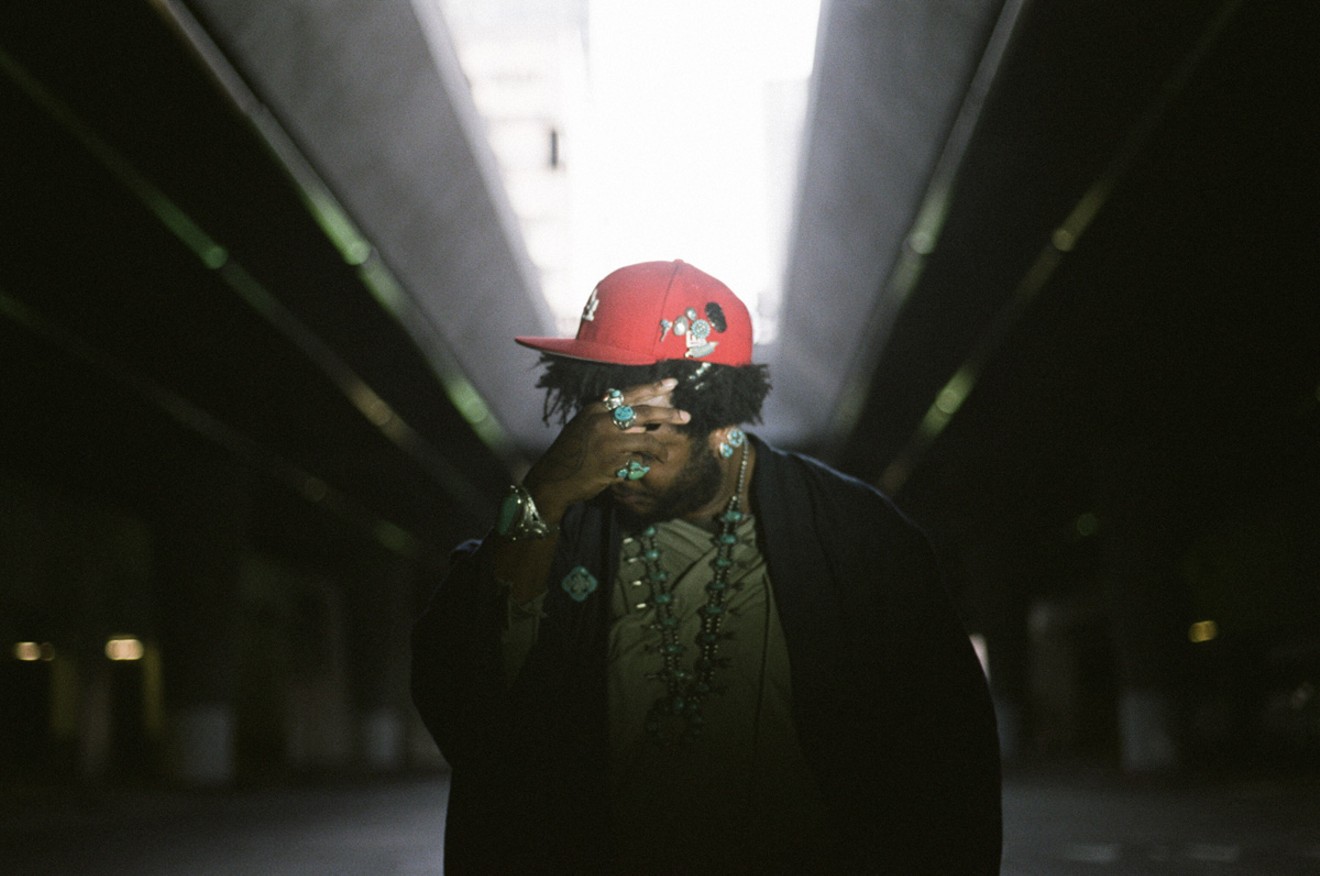Thundercat has had a career that would be the envy of any modern musician.
Born Stephen Bruner, he started playing music at four, when his father taught him bass. By the time Bruner was sixteen, he'd joined his brother Ronald, a drummer, as a member of the thrash/punk band Suicidal Tendencies. He stayed with the group for thirteen years.
Somewhere along the line, Bruner picked up session work, recording on Erykah Badu's pair of New Amerykah albums, where he worked alongside members of the Roots and Flying Lotus. He played on Kamasi Washington's 2015 album, The Epic, on Childish Gambino's 2013 album, Because the Internet, and he has become a creative partner with Flying Lotus, contributing to each of that artist's albums since 2010's Cosmogramma. In turn, Lotus has worked with Bruner on his solo records, including this year's Drunk. If Badu's albums weren't high-profile enough, Bruner also performed and did production work on Kendrick Lamar's most recent albums, To Pimp a Butterfly and Untitled Unmastered.
Bruner's mastery of tone and bass technique speaks for itself, but it's his keen understanding of how bass fits into the structure of pop, rock, R&B and hip-hop songs that has made him an in-demand collaborator and a significant songwriter in his own right.
In advance of his show at the Bluebird Theater tonight, Wednesday, February 22, we spoke with Bruner about his collaborations and the impact of comic-book artist Grant Morrison on his work.
Westword: J Dilla contributed to New Amerykah Part Two (Return of the Ankh) before he passed away in 2006. Did you get to work with him in any way prior to the recording sessions for those albums?
Thundercat: Oh, man, the Dilla moment. That's a really serious thing for me. The crazy part is that right before Dilla left and died, the conversation I had with him was along the lines of working [together]. Everybody has this Dilla moment, but for me that was good enough. That was the part where I felt like he saw something in whatever I was doing to the point where he wanted to work with me. I'll never forget it. I don't talk about it much. It's been [over] a decade since he passed. A lot of time people only know Dilla by a batch of beats they got. It's become almost like John Coltrane; it's become an institution.
I would never try to go and say, “Oh, yeah, Dilla wanted...” It's not about that. It's the part where I could call Dilla before he died. I remember the last thing he said to me. He was like, “When I get back from Brazil, we're gonna work. Me and you are going to sit down and create and see what we can come up with. I couldn't tell anybody about that. B+ and House Shoes, they knew about it. But there's the part where I didn't know what to say or do. I couldn't tell family members. I couldn't tell people I worked with. It was just like, “Oh, my God! Oh, my God!” That was literally how I felt. I couldn't believe that that conversation even existed in which I could talk to Dilla like that. And he passed soon after that. I remember the two to three conversations where we spent time talking about listening to music and wanting to understand different things.
When I look back on it, I forget Dilla was a cellist. I remember doing “Suite for Ma Dukes,” and I brought the cello out [because of] him. Things pass over you or wash over you over time, and huh, cool, or whatever, but that was more than cool. That said a lot about him that I didn't even realize in the moment, that we started talking, that he could relate. Everybody has their Dilla moment. You want to tell everybody to shut up. But you also want to say, “I knew him. And I'm happy I had a chance to meet him, and it wasn't weird.” When Sa-Ra and Dilla did “Thrilla,” I was there for that.
It's often overlooked that J Dilla was a gifted drummer, too.
That's what I'm saying. People forget that he was an instrumentalist. People romanticize the idea of his beats that he's dragging behind the beat. No, that motherfucker was right on time. He got it. Everybody else didn't get it. He didn't drag. That's how it's supposed to feel. Trippy shit, man.
There are references to animation series and manga in your work. The video for “Walkin'," in particular, is reminiscent of the surreal and playful side of Grant Morrison's work. How has his work impacted your own?
It's embedded in there. Once you've read something and understand him, it becomes what you're looking for. After reading Grant Morrison's X-Men, that shook my whole shit up. I didn't know if I was gay. I didn't know what was going on. Am I gay now? Is Beast gay? Is Wolverine gay? I would be, like, can anybody see me right now? Is anybody reading with me? He knows how to get in your head like that, which is beautiful.
Thundercat with Zack Fox, Wednesday, February 22, 7 p.m. doors, 8 p.m. show, Bluebird Theater, 303-377-1666, $18/20, SOLD OUT, 16+.
[
{
"name": "Air - MediumRectangle - Inline Content - Mobile Display Size",
"component": "12017618",
"insertPoint": "2",
"requiredCountToDisplay": "2"
},{
"name": "Editor Picks",
"component": "17242653",
"insertPoint": "4",
"requiredCountToDisplay": "1"
},{
"name": "Inline Links",
"component": "18838239",
"insertPoint": "8th",
"startingPoint": 8,
"requiredCountToDisplay": "7",
"maxInsertions": 25
},{
"name": "Air - MediumRectangle - Combo - Inline Content",
"component": "17261320",
"insertPoint": "8th",
"startingPoint": 8,
"requiredCountToDisplay": "7",
"maxInsertions": 25
},{
"name": "Inline Links",
"component": "18838239",
"insertPoint": "8th",
"startingPoint": 12,
"requiredCountToDisplay": "11",
"maxInsertions": 25
},{
"name": "Air - Leaderboard Tower - Combo - Inline Content",
"component": "17261321",
"insertPoint": "8th",
"startingPoint": 12,
"requiredCountToDisplay": "11",
"maxInsertions": 25
}
]












